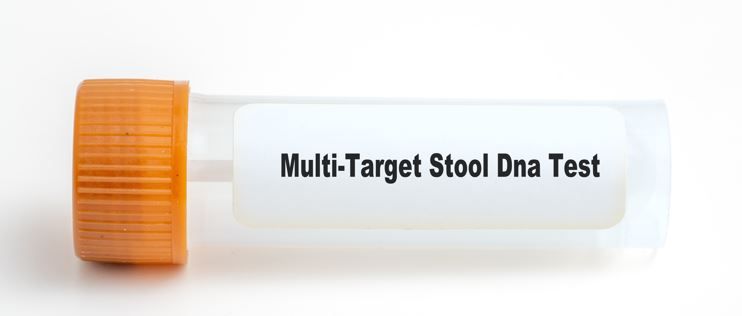- Clinical Technology
- Adult Immunization
- Hepatology
- Pediatric Immunization
- Screening
- Psychiatry
- Allergy
- Women's Health
- Cardiology
- Pediatrics
- Dermatology
- Endocrinology
- Pain Management
- Gastroenterology
- Infectious Disease
- Obesity Medicine
- Rheumatology
- Nephrology
- Neurology
- Pulmonology
Multitarget Stool DNA Testing Outperforms FIT/FOBT for Completed Follow-up Colonoscopy in CRC-Vulnerable Populations
DDW 2025. Follow-up colonoscopy after a positive stool-based test was superior among adults aged 45-49 and across diverse populations whose original test was mt-sDNA.
A pair of complementary studies presented at Digestive Disease Week (DDW) 2025, found that multitarget stool DNA (mt-sDNA) testing significantly outperforms traditional stool-based colorectal cancer (CRC) screening methods in driving follow-up colonoscopy (FU-CY) adherence. The studies demonstrated greater adherence to FU-CY among the youngest age group now eligible for CRC screening and also across diverse racial and ethnic groups.
©luchschenF/stock.adobe.com

The first study focused specifically on adults aged 45-49 years, a population recently added to colorectal cancer screening guidelines by both the US Preventive Services Task Force (2021) and American Cancer Society (2018). Researchers analyzed 13,921 patients with positive screening results between January 2017 and June 2022, including 7,492 mt-sDNA users and 6,429 fecal immunochemical test (FIT) or fecal occult blood test (FOBT) users. The primary outcome was FU-CY adherence, defined as evidence of colonoscopy (based on CPT codes) within 12 months following the index date (date of first test result), according to the study. Data were collected from large integrated national multipayer claims database.
The team found that 85.0% of participants who had positive results on a mt-sDNA completed recommended follow-up colonoscopies compared to approximately one-third (35.2%) of FIT/FOBT users (P <.01). The cohort was well balanced across gender (52% women) and included participants who self-identified as White (51%), Black (9%), Hispanic (10%), Asian/Pacific Islander (5%), and other (25%).
The researchers observed mt-sDNA FU-CY adherence rates ranging from 67.6% to 86.6% across demographic groups, consistently surpassing FIT/FOBT adherence rates of 30.5% to 45.7%. Men and participants self-identified as Asian/Pacific Islanders demonstrated the highest adherence among mt-sDNA users, with rates exceeding 82% across all sex and racial/ethnic categories.
Study authors also reported faster colonoscopy follow-up with mt-sDNA testing, with participants completing colonoscopies in a mean of 74.5 days versus 90.8 days for FIT/FOBT recipients.
"These results suggest that in younger patient populations, screening with mt-sDNA may help reduce disparities in follow-up colonoscopy adherence," the authors wrote in the study abstract. Furthermore, they added, the higher adherence rate and shorter time to follow-up colonoscopy in patients initially screened with mt-sDNA supports the use of this screening option among in this newly-eligible adult population compared to traditional stool-based tests.
FU-CY Completion Across Race/Ethnicity
The second study expanded the analysis to include 356,409 individuals from the national claims database aged 45 years or older (mt-sDNA n=286,063; FIT/FOBT n=70,346) with positive screening results during the same time period. This larger cohort comprised 54% women, with 61% of participants aged 60-75 years. Participants self-identified as White (64%), Black (8%), Hispanic (7%), Asian/Pacific Islander (3%), and other (18%).
Overall, FU-CY adherence reached 77.2% in the mt-sDNA group versus 45.1% in the FIT/FOBT group within 12 months of a positive screening result, according to the study. The mt-sDNA advantage persisted across all racial/ethnic subgroups. Adherence among Asian/Pacific Islander was 33.3 percentage points higher with mt-sDNA compared to FIT/FOBT (74.4% vs 41.1%). Among those self-identified as White, the advantage was 31.9 percentage points higher (77.3% vs 45.4%), while the difference in FU-CY between mg-sDNA vs FIT/FOBT among Hispanic participants was 29.3 percentage points (74.4% vs 45.1%).
The researchers emphasized that FU-CY adherence exceeded 71% across all racial/ethnic groups in the mt-sDNA cohort, highlighting the test's effectiveness in driving CRC screening completion across diverse populations. This finding carries particular importance given that colorectal cancer is often diagnosed at more advanced stages in certain minority populations, the authors wrote.
Considering investigators' conclusions from both studies, the suggestion is strong that mt-sDNA testing drives significantly better follow-up behaviors compared to traditional stool-based tests, supporting its use as an effective CRC screening approach across age groups and diverse populations. They emphasized that timely follow-up after positive non-invasive screening remains crucial to minimize colorectal cancer-related complications and reduce mortality.
Read more about colorectal cancer incidence, prevalence, and optimal screening practices in Patient Care's Colorectal Cancer Screening Topic Center
